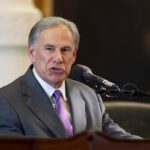Critical Race Theory has come out of nowhere to become one of the top political issues that concern Americans, but while the hot button issue is constantly up for discussion, some individuals believe that questioning why many Black Americans believe the education concept is “racist” is not a viable line of questioning.
Texas Rep. Marc Veasey (D), recently took issue with being asked what his thoughts were about “fellow Black Americans” called critical race theory racist.
Rep. Veasey's opposition to the question shortly after attending a House Committee briefing last week.
Q: What do you think when a fellow Black American oppose Critical Race Theory, call it racist?
Vecsey: I don’t think that is a serious question. I don’t think that is a serious question.
The education concept is as divisive an issue as any. CRT teaches that Americans are inherently racist. This question is very serious.
The basic tenets for CRT are as follows (Brittanica):
1) Race is socially constructed, not biologically natural.
(2) Racism in the United States is normal, not aberrational: it is the common, ordinary experience of most people of colour.
(3) Owing to what critical race theorists call “interest convergence” or “material determinism,” legal advances (or setbacks) for people of colour tend to serve the interests of dominant white groups. Thus, the racial hierarchy that characterizes American society may be unaffected or even reinforced by ostensible improvements in the legal status of oppressed or exploited people.
(4) Members of minority groups periodically undergo “differential racialization,” or the attribution to them of varying sets of negative stereotypes, again depending on the needs or interests of whites.
(5) According to the thesis of “intersectionality” or “antiessentialism,” no individual can be adequately identified by membership in a single group. An African American person, for example, may also identify as a woman, a lesbian, a feminist, a Christian, and so on.
(6) The “voice of colour” thesis holds that people of colour are uniquely qualified to speak on behalf of other members of their group (or groups) regarding the forms and effects of racism. This consensus has led to the growth of the “legal story telling” movement, which argues that the self-expressed views of victims of racism and other forms of oppression provide essential insight into the nature of the legal system.







